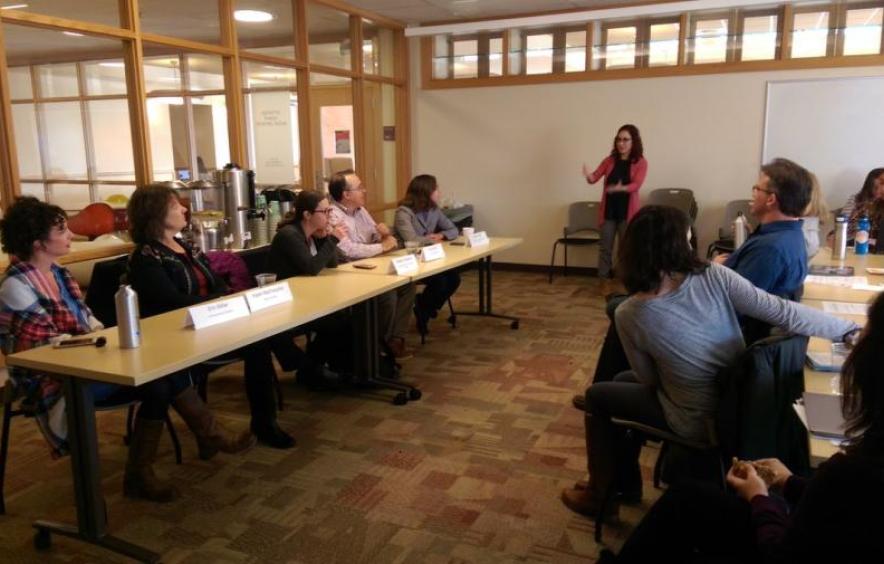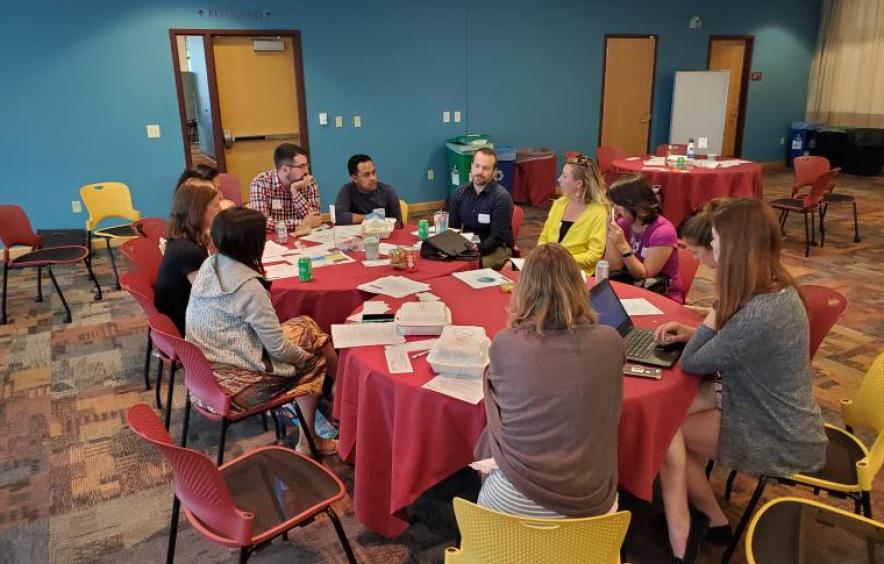Workshops & Training
We work with faculty to transform teaching and curriculum while championing hands-on learning in collaboration with community partners. Whether you are new to community engagement or have used engaged methods before, we have professional development opportunities for you.
On this page:
Community-Engaged Teaching 101
Community-Engaged Teaching 101 is for instructors who are new to community-engaged teaching. Participants will take part in training designed to increase knowledge about community-engaged pedagogy as well as prepare faculty to use best practices for community engagement in their courses. Participants are also asked to submit a syllabus from their newly developed (or revised) community-engaged course after teaching the course at least once. View a syllabus rubric used to evaluate and structure community-engaged learning here.
Participants will also receive:
- $600 stipend for attending the full training.
- $125 stipend for attendees who submit a syllabus for a newly developed (or revised) community-engaged course upon completion of teaching the course.
2024-2025 Workshop Schedule:
Winter CET 101 Training: December 3rd-4th, 2024
Summer CET 101 Training: There will be no Summer 2025 training
Faculty panels' examples are inspiring, I know there is institutional support for this type of work and through this workshop I understand best practices for [community-engaged teaching]. Community-Engaged Teaching 101 Participant

Communities of Practice
Communities of Practice are small cohorts of cross-campus faculty who are experienced community-engaged teachers. Each community of practice focuses on a unique theme related to community engagement, and creates space to do communal reflection, collective problem-solving, and knowledge-sharing related to that topic.
Each community of practice meets twice each quarter to explore and reflect upon ongoing learning and challenges. At the culmination of their year together, the communities of practice will have the opportunity to share their learning with the DU community at a Public Good Celebration. The structure and format of this forum will be determined by the community of practice. Each participant will also submit a written reflection with the option to have it published in a special issue of CCESL’s Public Good Impact Blog. Participants who meet the commitments are eligible to receive $250/quarter.
2024-2025 Communities of Practice
-
Elevating Your Community-Engaged Work
This community of practice will create a small cohort of cross-campus faculty who are interested in building their skills to communicate about and advocate for their community-engaged work. Together, faculty will gather twice per quarter to explore and reflect upon learning and challenges, including in developing, implementing, and communicating about community-engaged work.
Learning Objectives:
Build skills and capacity to communicate with a wide variety of audiences about your community-engaged work.
Prepare faculty leaders who champion community engagement for public problem-solving.
Build the reflective capacity of faculty participants.
Commitment: Each participating faculty will:
Share ideas and strategies with Cohort members, including by co-leading at least one discussion,
Develop a plan for implementing something learned through the cohort,
Complete pre- and post-program reflection activities, and
Submit one public reflection that can be published in CCESL’s Public Good Impact
Participants who meet the above commitments will be eligible to receive $750 ($250/quarter), either as a stipend or as a grant to support their community-engaged work.
The 2024-2025 application is now closed.
-
ASEM Pilot Community of Practice
Since 2005, the Advanced Seminar (ASEM) program has been a feature of undergraduate education at DU. To help students better understand the demands of contemporary life, instructors teach an advanced seminar based in their area of expertise and passion. The topic is approached from multiple perspectives in a course designed for nonmajors. Studying in this setting, students demonstrate their ability to:
- Integrate and apply content from multiple perspectives to an appropriate intellectual topic or issue.
- Write effectively, providing appropriate evidence and reasoning for assertions.
Building on these core learning objectives, we seek proposals for pilot ASEM Pathways to Signature Work courses that emphasize integrative learning to prepare students for subsequent signature work experiences that address public issues, such as those articulated in the Ideas to Impact and DU Grand Challenges initiatives. This would then be articulated as a third learning outcome: 3. Create a plan, pathway, some deliverable for signature work.
The 2024-2025 application is now closed.
2023-2024 Community of Practice
-
Mentoring Signature Work
This community of practice created a small cohort of cross-campus faculty who shared an interest in mentoring student signature work that addresses DU Grand Challenges issue areas to do communal reflection, collective problem-solving, and knowledge-sharing to build leadership skills and capacity for this work.
2022-2023 Communities of Practice
-
The Activist Academic
Inspired by The Activist Academic: Engaged Scholarship for Resistance, Hope and Social Change by Colette Cann and Eric DeMeulenaere, this community of practice will explore how to merge activism with academia and what it means to be an ‘activist academic’. Conversations will center critical reflection as faculty support each other in navigating difficulties, hope, and passion for change in academia. Participants will receive a copy of the book.
Facilitators:
Paula Cole, Teaching Professor, Economics
Co-Sponsors:
-
Creating Synergy in Community Engagement
How can community-engaged faculty members cooperate to produce a combined effect greater than the sum of their separate effects? From co-teaching a course across disciplines, to teaching separate classes that tackle a common community-identified need, faculty members across DU are collaborating in unique ways for the benefit of both their students and community partners. This community of practice will explore the specific challenges and opportunities that present themselves when we aim to create synergy in community engagement. We’ll bring together experienced practitioners and newcomers in a supportive environment as they build the community, skills, and knowledge needed to create these transformational collaborations.
Co-Sponsors:
2021-2022 Community of Practice
-
Engaging Onward
How do we, individually as instructors and collectively as colleagues, spring forward from these tumultuous times in ways that build abundance and justice for ourselves, our students, and communities through our courses? This community of practice creates space for communal reflection, collective problem-solving, and knowledge-sharing as we navigate where our community-engaged teaching has been and where we would like it to go.
Co-Sponsors:

Spark Sessions
Spark Sessions are informal, conversational style meet ups which aim to bring people together to spark new ideas and seed new collaborations. It is an opportunity for participants to drop-in at any time to enjoy some light food and beverages while giving or getting feedback and advice around a specific topic. Each session focuses on a topic of interest (e.g. sustainability, homelessness).
Check out our News & Events page for upcoming sessions.
2024-2025 Spark Sessions
-
Finding Funding for Community-Engaged Work
With Pam Encinas, Director of Research Grant Development
Thursday, September 26th | 11:15-12:45 | Community Commons 1100
Pam taught attendees how to identify, assess, and secure funding opportunities that aligned with their projects.
You can view the recording here: Spark Session: Finding Funding for Community-Engaged Scholarship
Click the + below to view past Spark Sessions
2023-2024 Spark Sessions
-
Snapshots of Confinement
Co-hosted by CCESL, this Spark Session was a screening of Snapshots of Confinement, a film highlighting how these photos reveal stories of community and resilience, transforming how this dark history is understood today. It was followed by an engaging Q&A session with film participants and DU Professor Esteban Gómez.
-
Minimizing Uncertainties & Mitigating Risks in Community Engagement
Participants at this CCESL Spark Session enjoyed light bites as they heard from Eric Hartman of Risk Management on gaining valuable strategies for navigating uncertainty in community engagement.
-
Community-Engaged Research: Collaborating for Public Impact
This CCESL Spark Session created a space for students, faculty, and staff across campus to exchange valuable feedback and advice on conducting community-engaged research to create measurable public impact.
-
Igniting Collaborations with K-12 Schools
This CCESL Spark Session created a space for students, faculty, and staff across campus to exchange valuable feedback and advice on establishing fruitful partnerships with K-12 schools.
-
Engage & Connect: Community Mixer
This CCESL Spark Session was co-hosted with the Leadership Studies program and the Daniel's College of Business. Students, faculty, and staff sparked new connections with one-another and with community partners, who shared opportunities for collaborative projects that address community-identified issues.
2022-2023 Eats & Engagements
-
Creating Synergies
How can community-engaged faculty members cooperate to produce a combined effect greater than the sum of their separate effects?
Held on February 15th, 2023, faculty members were invited to discuss, share ideas, and explore how to collaborate in unique ways that benefit both students and community partners; from co-teaching a course across disciplines, to teaching separate classes that tackle a common community-identified need.
-
Drug Treatment Courts, Due Process, & Jail Sanctions
Held on November 3rd, this Eats & Engagement focused on drug treatment courts and was facilitated by Michael D. Sousa, J.D., LL.M., M.A., Ph.D., Associate Professor of Law at the University of Denver Sturm College of Law. Drug treatment courts are specialized criminal tribunals that are aimed at providing long-term treatment services to offenders with severe substance use disorders as an alternative to prison or community corrections. But in the everyday practices of steering their participants towards living a more productive life, the jail sanctions imposed as a component of these programs may be stripping participants of their due process protections in the name of doing good.
2021-2022 Eats & Engagements
-
John Tiedemann: Creating & Sustaining Long-Term Community Partnerships
A meetup that discussed ideas, perspectives, and action step to establish ongoing, sustainable community partnerships in and outside of the classroom.
-
Anne DePrince: What Does it Take? Mentoring Students Community-Engaged Work
This meetup explored reflections on mentoring student community-engaged research and creative work – from apprehension to aspirations.
-
Julia Roncoroni: Dismantling the Ivory Tower - Community Partnerships to Advance Health Equity
A meetup that focused on how community partnerships can play a role in advancing health equity.
-
Ozy Aloziem: Radically Reimagining Community Engagement
This meetup explored the possibilities of reimagining community engagement.
It takes a lot of creativity to imagine a world that doesn’t exist while living within the realities of a world filled with a tremendous amount of suffering and oppression. It's crucial we find ways to practice this muscle of radical imagination so that we can imagine and then create the world we’re all deserving of but doesn’t yet currently exist. The purpose of the radical imagination game is to collectively practice radical imagination so that new innovative ideas and solutions can come to light.
Adding the Community-Engaged Attribute to Your Course
Did you know that you can add a “community-engaged” attribute to your courses that will appear in the Class Schedule? Tagging your course with the attribute helps:
- CCESL in tracking (and advocating for) the breadth of engaged class on campus
- Students in planning (they can even do a search for engaged classes specifically), and
- You gain attention for your work and we can recognize your contributions!
Demonstrating Community Engagement
Have you received funding, attended a training, participated in programming, or otherwise been connected with CCESL? We encourage you to indicate your affiliation with CCESL when you update your faculty materials in Watermark Faculty Success (formerly Activity Insite). Including this connection not only showcases your engagement and professional development but also demonstrates the broader impact of your work through CCESL’s support.
Learn HowContact
Cara DiEnno, Executive Director
Note: All CCESL programs, including these, undergo an antiracist, anti-oppression review at least annually. This year, changes were made to program materials and applications based on that review.
